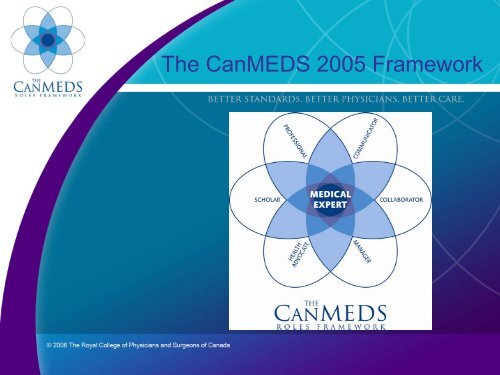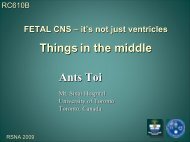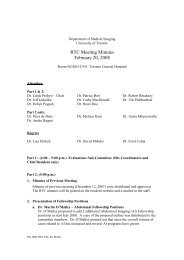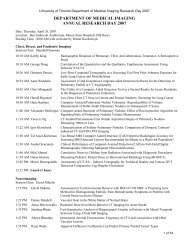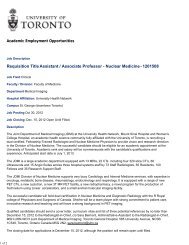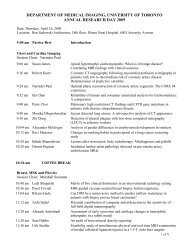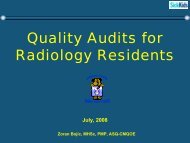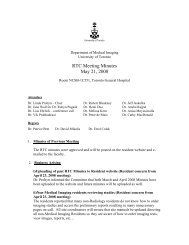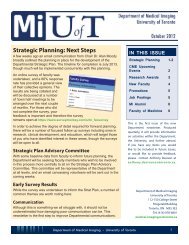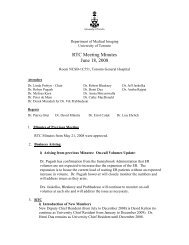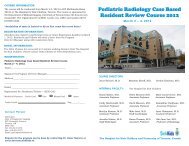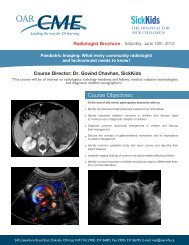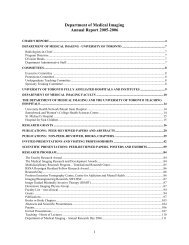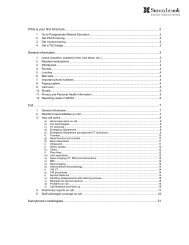The CanMEDS 2005 Framework - Department of Medical Imaging
The CanMEDS 2005 Framework - Department of Medical Imaging
The CanMEDS 2005 Framework - Department of Medical Imaging
Create successful ePaper yourself
Turn your PDF publications into a flip-book with our unique Google optimized e-Paper software.
<strong>The</strong> <strong>CanMEDS</strong> <strong>2005</strong> <strong>Framework</strong>
Contents<br />
1. <strong>CanMEDS</strong> Background<br />
2. <strong>CanMEDS</strong> Phase IV: Faculty Development<br />
3. <strong>CanMEDS</strong> <strong>2005</strong> <strong>Framework</strong>
1. <strong>CanMEDS</strong> Background
<strong>The</strong> 1996 <strong>Framework</strong><br />
… a path to the best physicians,<br />
the best care for Canadians
<strong>The</strong> Pr<strong>of</strong>ession<br />
What are some <strong>of</strong><br />
the challenges<br />
facing the medical<br />
pr<strong>of</strong>ession today
Challenges:<br />
Physicians’ Perspective<br />
• Quality care<br />
• Explosion <strong>of</strong> medical knowledge<br />
• Technology<br />
• Resources<br />
• Workload<br />
• Pay<br />
• Regulation<br />
• Medico legal<br />
• Maintaining competence
Challenges for the Pr<strong>of</strong>ession<br />
• How shall we prepare physicians to<br />
thrive in this environment<br />
• What are the “ideal competencies”<br />
• How can we train & maintain the best<br />
possible clinicians for Canada
<strong>CanMEDS</strong> Project Goal<br />
To identify the core competencies<br />
generic to all specialists to meet<br />
the needs <strong>of</strong> society
Methods: 1996 framework<br />
• Expert panels<br />
• Systematic literature review<br />
• Focus groups<br />
• Broad consultation<br />
• Iterations
<strong>CanMEDS</strong> Phases<br />
Methods and Phases <strong>of</strong> <strong>CanMEDS</strong> Development<br />
Phase I – Development<br />
Identification, development and validation <strong>of</strong> the <strong>CanMEDS</strong> Roles<br />
<strong>Framework</strong> (1993-1996)<br />
Phase II – Experimentation<br />
& Pilot<br />
Development <strong>of</strong> practical tools and methods to facilitate resident<br />
learning and evaluation <strong>of</strong> the <strong>CanMEDS</strong> competencies (1996-1997)<br />
Phase III – Implementation<br />
Phase IV – Faculty<br />
Development<br />
Implementation into Canadian specialty postgraduate medical<br />
education, including adoption into RCPSC accreditation, certification<br />
and examination standards (1997-2002)<br />
Systematic implementation with enhanced materials and faculty<br />
development (2002-present)
<strong>CanMEDS</strong> Roles<br />
• <strong>Medical</strong> Expert<br />
• Communicator<br />
• Collaborator<br />
• Manager<br />
• Health Advocate<br />
• Scholar<br />
• Pr<strong>of</strong>essional
2. <strong>CanMEDS</strong> Phase IV:<br />
Faculty Development
<strong>CanMEDS</strong> Phase IV Goals<br />
<strong>The</strong> activities <strong>of</strong> Phase IV are designed to meet the stated needs<br />
<strong>of</strong> educators for further support by enhancing:<br />
• incorporation <strong>of</strong> the <strong>CanMEDS</strong> competencies into all Canadian<br />
specialty PGME program curricula<br />
• effective evaluation methods for the <strong>CanMEDS</strong> competencies<br />
• incorporation <strong>of</strong> <strong>CanMEDS</strong> into Royal College policies,<br />
structures, programs, and staff development
<strong>CanMEDS</strong> Working Groups:<br />
Rationale & Tasks<br />
• Eight Working Groups comprised <strong>of</strong> Fellows and<br />
educators commissioned in 2003 to:<br />
‣ reexamine and update the overall <strong>CanMEDS</strong><br />
competency framework;<br />
‣ address the issues that have arisen with each Role<br />
since its adoption by the RCPSC in 1996; and<br />
‣ prepare recommendations on such issues as<br />
wording, standards, teaching and learning, and<br />
evaluation.
<strong>CanMEDS</strong> Working Groups:<br />
Rationale & Tasks<br />
• Intensive and rewarding process involving a tremendous<br />
amount <strong>of</strong> work that drew on hundreds <strong>of</strong> individuals.<br />
• Peer reviewers and program directors who have<br />
examined the working group draft reports have been<br />
overwhelmingly enthusiastic about the changes.
3. <strong>CanMEDS</strong> <strong>2005</strong>:<br />
Role by Role Changes
<strong>CanMEDS</strong> <strong>Medical</strong> Expert Role<br />
• Emphasis as central Role<br />
• Integration<br />
• Consultant & consultation<br />
• Hx, Px, procedural skills<br />
• Core knowledge base<br />
• Dx, Tx<br />
• Maintenance <strong>of</strong> competence<br />
• Ethical
Definition: <strong>Medical</strong> Expert<br />
<strong>2005</strong><br />
As <strong>Medical</strong> Experts, physicians integrate all<br />
<strong>of</strong> the <strong>CanMEDS</strong> Roles, applying medical<br />
knowledge, clinical skills, and pr<strong>of</strong>essional<br />
attitudes in their provision <strong>of</strong> patientcentered<br />
care. <strong>Medical</strong> Expert is the<br />
central physician Role in the <strong>CanMEDS</strong><br />
framework.
Key Competencies: <strong>Medical</strong><br />
Expert<br />
As <strong>Medical</strong> Experts, physicians are able to…<br />
1. Function effectively as consultants, integrating all <strong>of</strong> the <strong>CanMEDS</strong><br />
Roles to provide optimal, ethical and patient-centered medical<br />
care;<br />
2. Establish and maintain clinical knowledge, skills and attitudes<br />
appropriate to their practice;<br />
3. Perform a complete and appropriate assessment <strong>of</strong> a patient;<br />
4. Use preventive and therapeutic interventions effectively;<br />
5. Demonstrate pr<strong>of</strong>icient and appropriate use <strong>of</strong> procedural skills,<br />
both diagnostic and therapeutic;<br />
6. Seek appropriate consultation from other health pr<strong>of</strong>essionals,<br />
recognizing the limits <strong>of</strong> their expertise.
<strong>CanMEDS</strong> Communicator Role<br />
• Updated for shared decisionmaking,<br />
patient-centred<br />
• Focus on communication skills<br />
<strong>of</strong> before, during, and after<br />
clinical encounter<br />
• Other communication skills<br />
moved to Collaborator,<br />
Manager, Scholar
Definition: Communicator<br />
<strong>2005</strong><br />
As Communicators, physicians<br />
effectively facilitate the doctor-patient<br />
relationship and the dynamic<br />
exchanges that occur before, during,<br />
and after the medical encounter.
Key Competencies:<br />
Communicator<br />
As Communicators, physicians are able to…<br />
1. Develop rapport, trust and ethical therapeutic relationships with<br />
patients and families;<br />
2. Accurately elicit and synthesize relevant information and<br />
perspectives <strong>of</strong> patients and families, colleagues and other<br />
pr<strong>of</strong>essionals;<br />
3. Accurately convey relevant information and explanations to<br />
patients and families, colleagues and other pr<strong>of</strong>essionals;<br />
4. Develop a common understanding on issues, problems and<br />
plans with patients and families, colleagues and other<br />
pr<strong>of</strong>essionals to develop a shared plan <strong>of</strong> care;<br />
5. Convey effective oral and written information about a medical<br />
encounter.
<strong>CanMEDS</strong> Collaborator Role<br />
• Updated with new<br />
interpr<strong>of</strong>essional concepts &<br />
research<br />
• Collaborative care & shared<br />
decision-making<br />
• Conflict resolution<br />
• Effective consultation<br />
• Teams
Definition: Collaborator <strong>2005</strong><br />
As Collaborators, physicians<br />
effectively work within a healthcare<br />
team to achieve optimal patient care.
Key Competencies:<br />
Collaborator<br />
As Collaborators, physicians are able to…<br />
1. Participate effectively and appropriately in an inter-pr<strong>of</strong>essional<br />
healthcare team;<br />
2. Effectively work with other health pr<strong>of</strong>essionals to prevent,<br />
negotiate, and resolve interpr<strong>of</strong>essional conflict.
<strong>CanMEDS</strong> Manager Role<br />
• Emphasis on effectiveness in health<br />
care organizations<br />
• Same focus on resource decision-making<br />
• Updated for current health care context<br />
• Sustainable practice<br />
• “Team” competencies moved<br />
to Collaborator<br />
• Leadership and administrative roles
Definition: Manager <strong>2005</strong><br />
As Managers, physicians are<br />
integral participants in healthcare<br />
organizations, organizing sustainable<br />
practices, making decisions about<br />
allocating resources, and<br />
contributing to the effectiveness <strong>of</strong><br />
the healthcare system.
Key Competencies: Manager<br />
As Managers, physicians are able to…<br />
1. Participate in activities that contribute to the effectiveness<br />
<strong>of</strong> their healthcare organizations and systems;<br />
2. Manage their practice and career effectively;<br />
3. Allocate finite healthcare resources appropriately;<br />
4. Serve in administration and leadership roles, as<br />
appropriate.
<strong>CanMEDS</strong> Health Advocate<br />
Role<br />
• Clarified wording, same concepts<br />
• Now more literature<br />
• Advocacy for individual, patients, and communities<br />
• Physician influence and health care system<br />
knowledge for patient care<br />
• Mobilizing resources<br />
• Determinants <strong>of</strong> health
Definition: Health Advocate<br />
<strong>2005</strong><br />
As Health Advocates, physicians<br />
responsibly use their expertise and influence<br />
to advance the health and well-being <strong>of</strong><br />
individual patients, communities, and<br />
populations.
Key Competencies:<br />
Health Advocate<br />
As Health Advocates, physicians are able to…<br />
1. Respond to individual patient health needs<br />
and issues as part <strong>of</strong> patient care;<br />
2. Respond to the health needs <strong>of</strong> the<br />
communities that they serve;<br />
3. Identify the determinants <strong>of</strong> health <strong>of</strong> the<br />
populations that they serve;<br />
4. Promote the health <strong>of</strong> individual patients,<br />
communities and populations.
<strong>CanMEDS</strong> Scholar Role<br />
• Updated wording, same<br />
concepts<br />
• Lifelong learning, CPD<br />
• Critical appraisal<br />
• Research skills<br />
• Teaching others<br />
• Boyer’s Scholarship
Definition: Scholar <strong>2005</strong><br />
As Scholars, physicians demonstrate a<br />
lifelong commitment to reflective learning,<br />
as well as the creation, dissemination,<br />
application and translation <strong>of</strong> medical<br />
knowledge.
Key Competencies: Scholar<br />
As Scholars, physicians are able to…<br />
1. Maintain and enhance pr<strong>of</strong>essional activities through<br />
ongoing learning;<br />
2. Critically evaluate information and its sources, and<br />
apply this appropriately to practice decisions;<br />
3. Facilitate the learning <strong>of</strong> patients, families, students,<br />
residents, other health pr<strong>of</strong>essionals, the public, and<br />
others, as appropriate;<br />
4. Contribute to the creation, dissemination, application,<br />
and translation <strong>of</strong> new medical knowledge and<br />
practices.
<strong>CanMEDS</strong> Pr<strong>of</strong>essional Role<br />
• Updated to address controversies and<br />
confusion<br />
• Commitments to society, pr<strong>of</strong>ession,<br />
and self<br />
• Ethical practice<br />
• Sustainable practice & well-being<br />
• Pr<strong>of</strong>ession-led regulation<br />
• Pr<strong>of</strong>essionalism
Definition: Pr<strong>of</strong>essional<br />
<strong>2005</strong><br />
As Pr<strong>of</strong>essionals, physicians are<br />
committed to the health and wellbeing<br />
<strong>of</strong> individuals and society<br />
through ethical practice, pr<strong>of</strong>essionled<br />
regulation, and high personal<br />
standards <strong>of</strong> behaviour.
Key Competencies:<br />
Pr<strong>of</strong>essional<br />
As Pr<strong>of</strong>essionals, physicians are able to…<br />
1. Demonstrate a commitment to their patients,<br />
pr<strong>of</strong>ession, and society through ethical practice;<br />
2. Demonstrate a commitment to their patients,<br />
pr<strong>of</strong>ession, and society through participation in<br />
pr<strong>of</strong>ession-led regulation;<br />
3. Demonstrate a commitment to physician health and<br />
sustainable practice.
Summary and Conclusions<br />
<br />
<br />
<br />
<br />
<br />
<br />
Revised, improved framework<br />
Updated concepts<br />
Clarified wording<br />
Greater utility<br />
Positive peer reviews<br />
World leadership
References<br />
Frank, J.R. (Ed). <strong>2005</strong>. <strong>The</strong> <strong>CanMEDS</strong> <strong>2005</strong> physician competency<br />
framework. Better standards. Better physicians. Better care.<br />
Ottawa: <strong>The</strong> Royal College <strong>of</strong> Physicians and Surgeons <strong>of</strong> Canada.<br />
Frank, J.R. & B. Langer. 2003. Collaboration, communication,<br />
management and advocacy: Teaching surgeons new skills<br />
through the <strong>CanMEDS</strong> Project. World Journal <strong>of</strong> Surgery. 27:972-<br />
978.<br />
Frank, J.R., Tugwell, P. (Chair) et al. 2000. <strong>CanMEDS</strong> 2000. <strong>Medical</strong><br />
Teacher 22(6):549-54.<br />
Frank, J.R., Tugwell, P. (Chair) et al. 1996. Skills for the New<br />
Millennium: Report <strong>of</strong> the Societal Needs Working Group.<br />
Ottawa: <strong>The</strong> Royal College <strong>of</strong> Physicians and Surgeons <strong>of</strong> Canada
For more information…<br />
<strong>The</strong> <strong>CanMEDS</strong> physician competency framework serves as<br />
a benchmark for high standards and are useful to:<br />
‣ Physicians in practice (assessment <strong>of</strong> practice and<br />
maintenance <strong>of</strong> competence); and<br />
‣ <strong>Medical</strong> educators (accreditation, credentialing,<br />
and examinations)<br />
Visit us at<br />
http://rcpsc.medical.org/canmeds for<br />
additional <strong>CanMEDS</strong> tools and resources


